As far as the protection of the G-7 summit in Elmau, which ended on Tuesday, is concerned, the hundredth must be the smallest calculation variable. In this respect, there were very few judges who worked shifts in the justice center in the ski jumping stadium in Garmisch-Partenkirchen, which was stacked up from 260 gray containers – 55 in total, hardly more than half a hundred. Apparently there was not much to arrange for them, at least until Tuesday there was only talk of temporary detention and an arrest warrant for masking at the Garmisch demonstration on Sunday and the subsequent refusal to provide personal details.
From the point of view of the Garmisch district office, this large demonstration could have been one of the largest demonstration events in Bavaria in recent years – at least that is what summit critics quote from the approval notice. Probably not even 1,000 people actually demonstrated, accompanied by at least as many police officers. Even more impressive was the support ratio during the march in the direction of Elmau on Monday, where the activists did not set off a total of hundreds, but the police did so many hundreds that a different calculation size would probably be necessary.
After all, at the following small demonstration near the castle, which was officially limited to 50 participants, there was still reason for six provisional arrests for attempted coercion. A few activists had sat on the street and had them carried away – including a climate protectionist who had announced “an action of civil disobedience” weeks ago and apparently saw the time for it. Until then, the cell containers in the stadium, designed for 150 prisoners, had only been filled briefly with a few delinquents, most of whom the police regarded as a kind of by-catch from ongoing border controls. On the occasion, a judge signed a second arrest warrant for a fake ID.
The diesel is said to have run out for a short time
Both sides agree that the sparse mobilization on the one hand could have something to do with the massive presence on the other. But some interpret this as a kind of stifling of freedom of assembly and demonstration through sheer superiority, while others see it as a successful security strategy. Most police officers privately admit that they were definitely not too few. The police columns drove and parked around the annoyed locals, whom Chancellor Olaf Scholz thanked on Tuesday “for their understanding, for their support and certainly for their patience at one point or another”. At times, all the cars protecting this summit dedicated to climate protection caused a veritable diesel crisis: At times, fuel ran out in Garmisch, locals tell of tank experiences in the midst of a line of armored water cannons. Many police units were housed far away and some were asked to refuel there. At a gas station, the diesel is said to have run out completely for a short time. That’s when the Technical Relief Agency refueled its generators, according to the police, who were in charge of these generators.
The police themselves – together with the delegations and hundreds of journalists – reliably filled all accommodation in the region. The Garmisch local chairman of the hotel and restaurant association, Daniel Schimmer, spoke on Tuesday of “very pleasant guests” and “long-term bookings with good rates”. But now in the holiday season the hotels would have filled up, which is why Schimmer would have preferred a summit in November. A number of innkeepers would have preferred to do without it entirely, because all the hundreds were usually catered for centrally. They also shop less than vacationers, according to repeated complaints from retailers. The last road closures were on Tuesday for the departure of the summit guests. Now the region can go on holiday again.

